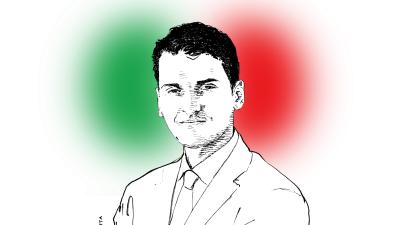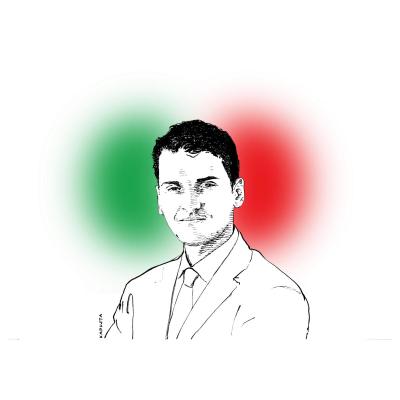The problem of mass immigration to Europe - a critical analysis
The growing migratory pressure at Europe's borders has shown clearly that, despite the already obvious problems involved, the migratory inflow is not being tackled with the necessary determination by the EU institutions. Yet irregular immigration is a problem that does not concern a single country but the whole of Europe.
The management of migratory flows could represent an opportunity for the European Union to demonstrate its necessity as an institution. Unfortunately, there is a danger that it will turn into yet another missed opportunity due to the EU’s inability to find solutions that go beyond slogans, warnings or proclamations. Therefore, in practice, it is the EU countries that have to deal with the arrival at their borders of millions of migrants who want to cross them illegally. To think that immigration is a problem that only affects individual countries is, however, wrong. When a person enters Poland, Italy or Spain illegally, he or she is not only crossing that country's borders but, thanks to free movement treaties, can move freely within the EU.
Nevertheless, the situation for Italy and Spain is particularly delicate because controlling a maritime border is much more difficult than in case of a land border. In addition, the proximity to North Africa implies a daily arrival of migrants that, if unregulated, risks breaking out of control.
If the European Union acted with the same determination to solve the problem of irregular immigration as the EU states do when implementing their own policies to curb immigration, the problem, even if not solved, would certainly be much reduced. Yet this is not the case, and while individual countries are left completely when facing a real emergency, political leaders who advocate stricter policies and the protection of national borders are accused by some media of implementing racist policies. In this regard, a clarification is necessary: a conservative approach is not characterised by an a priori opposition to immigration, but rather draws a distinction between regular and irregular immigration. Regulating it is not only fair to the inhabitants of a given country, but also to all immigrants who, over the years, have entered a new country legally, pay taxes, obey the laws, and have a legal employment. Uncontrolled immigration generates a series of issues - for example, in the area of security. Having within our borders people who we do not know who they are, what work they do to survive and where they live poses problems for public order. What is more, this pushes many irregular immigrants who have entered our countries into the arms of organised crime, which exploits them for illegal work. Such phenomena can be seen particularly in southern Italy. Just think of caporalato, i.e. the exploitation of thousands of irregular immigrants who are put to work in the fields and paid two to three euros an hour. This causes a problem from both the economic and the social point of view, since it leads to a general lowering of wages which discourages possible candidates from performing certain jobs legally.
Another risk is the formation of special enclaves (or ghetto districts) within cities. What has happened in Europe in countries like Belgium in the Molenbeek district of Brussels, in Sweden in Malmö and in some areas of Stockholm, or even in the French banlieues, should also be a wake-up call for the countries of Mediterranean Europe. The presence in our cities of entire areas inhabited by parallel communities that do not respond to our laws but, say, to Sharia law, is a wake-up call that we neither can nor should ignore.
We must, therefore, question the concept of multiculturalism understood as the creation of a community characterised by erasing our own culture and indigenous cultures. Roger Scruton defines “oikophobia” (hatred for one's own home) as that feeling, unfortunately increasingly widespread in the West, of suppression of our traditions and, consequently, of our identity, in the name of a multiculturalism that would like to put all cultures on the same level, forgetting who we are and where we come from.
As far as immigration is concerned, the entire Italian system should be rethought by implementing a crackdown on illegal immigration, and at the same time putting forward a proposal based on opening up to immigrants who can be integrated into our labour market. A system like this one is already in force in some countries, such as Australia, the United Kingdom or Canada, and is based on a common-sense vision that accepts from year to year a number of immigrants compatible with the possibilities of social and labour integration. This is exactly the opposite of uncontrolled and illegal immigration, which is a problem not only for those who receive but also for those who arrive. The arrival of more people than could be accommodated means, in fact, that there can be no real integration, and that many immigrants are forced to live by expediency or end up in the hands of organised crime. A phenomenon with which we are unfortunately familiar in Italy, where in some areas of the South the phenomenon of “caporalato” is widespread. The exploitation of immigrant labour, in many cases irregular, is a particularly odious phenomenon: firstly it does not respect human rights, and secondly it destroys the labour market. The agricultural sector is, in this respect, emblematic because it requires immigrants to work picking fruit, vegetables and vegetables for a few euros per hour.
On the contrary, what we need is a migration system based on two channels, both perfectly legal but counteracting illegal immigration. On the one hand, humanitarian corridors to take in refugees and people in real need; on the other, a system (which could be score-based like the British one) for skilled and selected immigration.
To enter Great Britain, one needs a score, which is obtained through a series of parameters: knowledge of the English language, a job offer, or a specialisation or salary standard. The aim is to attract 'the best from around the world' based on the logic that does not want to close borders as much as control arrivals and change the profile of immigrants. The aim is to prevent cheap foreign workers from affecting the general wage level by making it impossible for native workers to compete. These are therefore measures that not only stimulate immigration 'of the best' but also protect the lower and middle classes and workers.
The only way to avoid the prevalence of multiculturalism, therefore, is to strive for regulated immigration.
Read also
The centre-right wins in Lazio and Lombardy and strengthens the government
On 12-13 February 2023, votes were cast in Lombardy and Lazio, two of the main Italian regions where the cities of Milan and Rome are located. Lombardy is one of Europe's most important economic regions with 10 million inhabitants and a gross domestic product higher than many European states.
Francesco Giubilei
Meritocracy as “Racist” and “Imperialist” – towards a New, “Inclusive” Elite?
The “people versus elite” dichotomy, a distinctive feature of the populist (and to some extent sovereignist) discourse, continues to hold sway in contemporary political debate. Over recent years, however, the composition of Western and European elites has changed, and they have not only moved further and further away from the needs of the people, but have also become radicalised.
Francesco Giubilei
Conservatives and Classical Liberals - What to Choose?
In a political and cultural context as changeable as the contemporary one, any use of rigid categories to define parties and alignments or thinkers and men of culture can be misleading.








Comments (0)